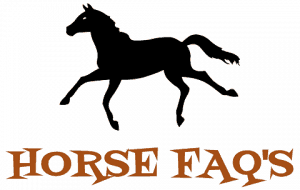Investing in horse property can be a great way to diversify your portfolio and increase your financial security. Horse property is an exciting and unique investment that offers both short-term and long-term potential. But before you make the leap, you need to know if it’s the right fit for you.
The idea of investing in horse property has grown in popularity in recent years, as people look for new opportunities to build wealth. From owning a farm or ranch to operating a boarding facility, there are numerous ways to capitalize on this type of real estate investment. But before you take the plunge, it’s important to understand what you’re getting into.
Is horse property a good investment? The answer depends on your individual goals and financial situation. The key is to do your research so that you can make an informed decision about whether this type of real estate is right for you. In this article, we will explore the potential benefits and drawbacks of investing in horse property so that you can make an educated choice about whether or not it’s the right move for your future.
Definition Of Horse Property
It’s no secret that horse property is an attractive investment. But what is it, exactly? Horse property refers to a parcel of land with structures or resources specifically designed for the care and boarding of horses. In other words, it’s the perfect setup for horse lovers who want to make the most out of their passion.
The most common type of horse property includes pastures and paddocks, barns, and arenas. Depending on how much land you own, you may also have access to trails and tracks for riding. For example, larger properties may also feature cross-country courses or dressage rings. As you can see, investing in this type of property requires a significant commitment – both financially and emotionally – so it’s important to weigh all your options carefully before taking the plunge.
So what should potential investors keep in mind when researching horse property? Well, first off they should consider location – not only because it will affect the value of the land but also because access to nearby amenities like feed stores and veterinarians is paramount for any successful equestrian venture. Additionally, climate conditions can play a key role in deciding which breeds are best suited for your particular area.
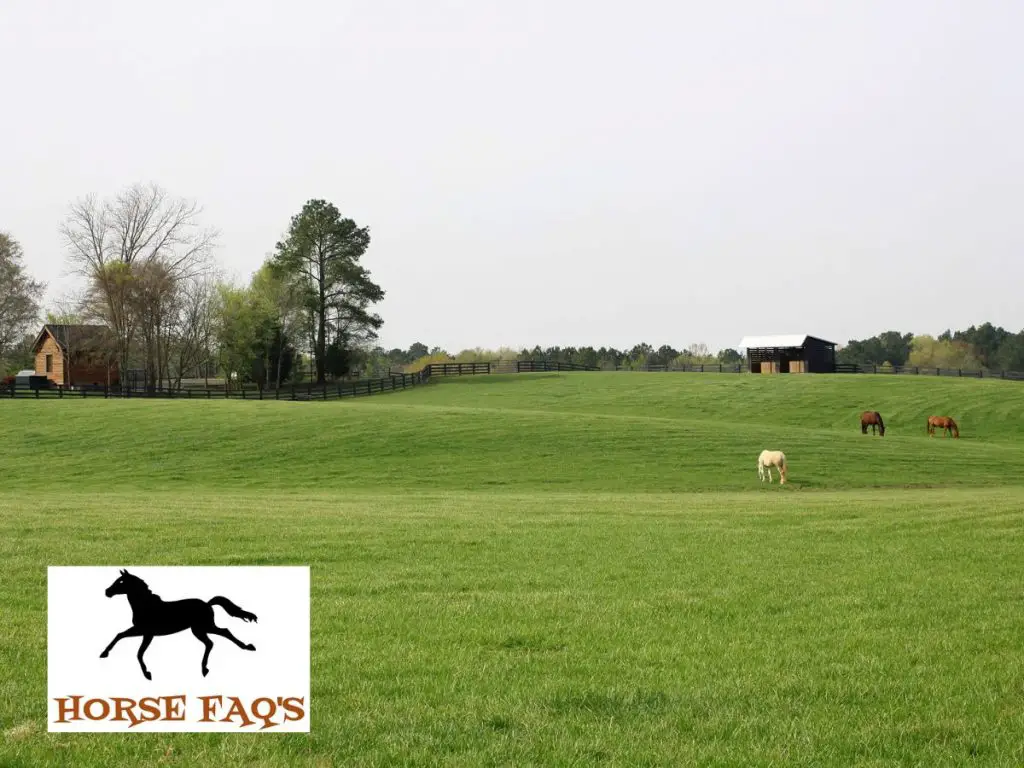
Factors To Consider When Investing In Horse Property
Are you looking for a sure-fire way to invest your hard-earned money? Well, there’s no easier way than to invest in horse property! No longer do you have to worry about the stock market’s wild fluctuations or any other unpredictable investments. Horse property is definitely the way to go!
Foreclosure.com
A simple way to find a Farm. Better Data Better Analytics!
But wait, before you jump in head first, let’s take a look at some factors that should be considered when investing in horse property. It’s important to think about the size of the land, what zoning laws may apply, and the cost of upkeep. Additionally, if you plan on leasing out your property or using it as an agritourism business opportunity, you’ll need to consider how these activities will affect your bottom line.
So while horse property may seem like an easy way to make money quickly, it’s important to take into account all of these factors before taking the plunge. Don’t forget that proper due diligence can help ensure that your investment pays off in the long run.
Advantages Of Investing In Horse Property
Investing in horse property has become an increasingly popular option for those looking to make a profitable return on their investments. According to recent data, over 25% of U.S. households now own horses, making it one of the fastest-growing segments of the American market. But what are the advantages of investing in horse property?
Firstly, owning horse property can be an excellent way to generate income from boarding and training fees, as well as hosting events such as polo matches and show jumping competitions. This can provide a steady stream of revenue for long-term investors and is especially appealing for those who have experience in managing horses or related businesses. Additionally, due to its typically rural location, horse property is often exempt from certain taxes that may apply to other types of real estate investments.
Another potential benefit of investing in horse property is that it can act as a great source of financial security — not only because it’s likely to appreciate over time but also because it can provide buyers with a sense of satisfaction that comes with owning something unique and valuable. Finally, TIP: if you’re considering buying horse property as an investment opportunity, look into local zoning laws and regulations beforehand so you know what restrictions might apply to your purchase.
By understanding these advantages, potential buyers can make informed decisions about whether or not investing in horse property is right for them.
Disadvantages Of Investing In Horse Property
Investing in horse property can be an exciting and rewarding venture, but it can also be a gamble if you don’t know what you’re getting into. It’s important to weigh the pros and cons before taking the plunge. Just like any investment, there are some potential drawbacks to consider.
To begin with, the cost of purchasing and maintaining horse property can be quite high. You’ll need to invest in land, fencing, stables, feed and other necessary supplies – all of which adds up quickly. On top of that, you may have to pay for veterinary care or hoof care services for your horses. As such, it’s essential that you do your research and accurately calculate costs before investing in horse property.
Furthermore, running a successful stable requires a lot of hard work and dedication. You’ll need to ensure that the horses are well cared for at all times; this could involve frequent visits to check on them as well as regular cleaning and maintenance tasks within the stable itself. Plus, if you want to make a profit from running your horse property then you’ll also need to factor in additional costs such as advertising or hiring staff members. All these factors will take time and commitment that not everyone may be able or willing to give.
All things considered, investing in horse property can be a great way to make a living from something you love – provided that you understand what’s involved beforehand. With proper planning and preparation, those who are passionate about horses can create a successful business out of their passion! Now let’s look at some financing options for horse property so you can decide if it’s right for you!
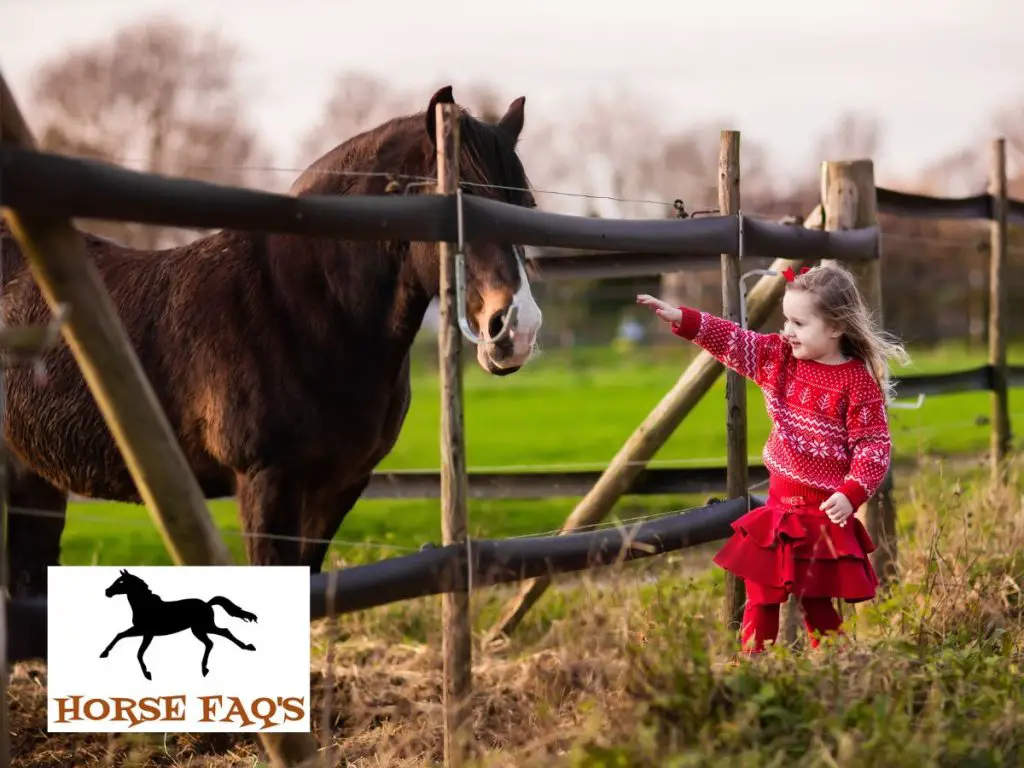
Financing Options For Horse Property
Financing options for horse property – these magical words are like a dream come true for many investors. Who wouldn’t want to dip their toes in the luxury of owning and investing in horse property? But getting financing for horse property can sometimes be a challenge.
Fortunately, there are numerous financing options available. Investors can use conventional loans, such as banks and credit unions, and they can also access government-backed loans with lower interest rates. For those who have excellent credit and enough cash to cover closing costs, there is also private money lenders who offer more flexible terms.
No matter which route you take, it’s important to know that lenders typically require 20%-30% down payment when financing horse properties. This means you must have ready access to liquid capital so you can make this large down payment, as well as be prepared for the additional costs associated with buying a home or ranch. With proper preparation and research on your part, the process of acquiring financing for horse property can be quite straightforward.
Tax Implications Of Investing In Horse Property
Investing in horse property can be a great way to build wealth, but it’s important to understand the tax implications involved. Before jumping into such an investment, it’s wise to understand the laws and regulations that govern it. This article will explore the tax implications of investing in horse property.
First, you should know that there are a number of deductions available for those who own horse property. Depending on your location, you may be able to deduct mortgage interest, taxes paid on the property, and even certain maintenance costs associated with owning horses. Additionally, individuals may be eligible for capital gains exemptions when they sell their horse property.
Another important factor to consider when investing in horse property is depreciation. Depreciation allows investors to deduct a portion of the cost of their investment each year over its useful life. This can help investors reduce their taxable income and can provide significant savings in the long run. It’s important to note that depreciation rates vary by location so it’s essential to check with your local jurisdiction before investing in horse property.
With this information in mind, it’s clear that there are many opportunities for investors when it comes to reducing taxes associated with horse properties . Understanding these tax implications is vital for any investor considering investing in this type of real estate asset. With this knowledge at hand, investors are better equipped to determine whether or not investing in horse property is right for them. From here, we’ll explore the pros and cons of making such an investment.
Pros And Cons Of Investing In Horse Property
Investing in horse property can be a tantalizing prospect. After all, who wouldn’t want to own their own piece of paradise? But before you jump right in and make an investment, it’s important to weigh the pros and cons of this unique real estate opportunity. Here are 3 key points to consider when deciding whether horse property is the right fit for your portfolio:
First, the potential financial rewards of investing in horse property can be great. From renting out stalls and pastures to hosting horse shows or events, there are a variety of ways to generate passive income from your asset. Additionally, if you purchase land zoned for residential use, you could build and sell homes on the property for an added profit.
On the other hand, there are significant costs associated with owning horse property that need to be taken into account as well. Maintenance expenses will likely include regular mowing, fencing repairs, and upkeep on the stables or other structures on the land. In addition, depending on where you live, there may be zoning restrictions or ordinances that limit what kind of activities can take place on your property—which could potentially impact profitability long-term.
It’s also important to note that horse properties are often high-risk investments because they tend to depreciate over time due to wear and tear or changing trends in equine activities. With that said, being mindful of these areas before taking the plunge is essential for any investor looking for success with horse property.
With a better understanding of both the potential opportunities and drawbacks related to investing in horse property, it’s time dive into some case studies of successful investors who have made it work…
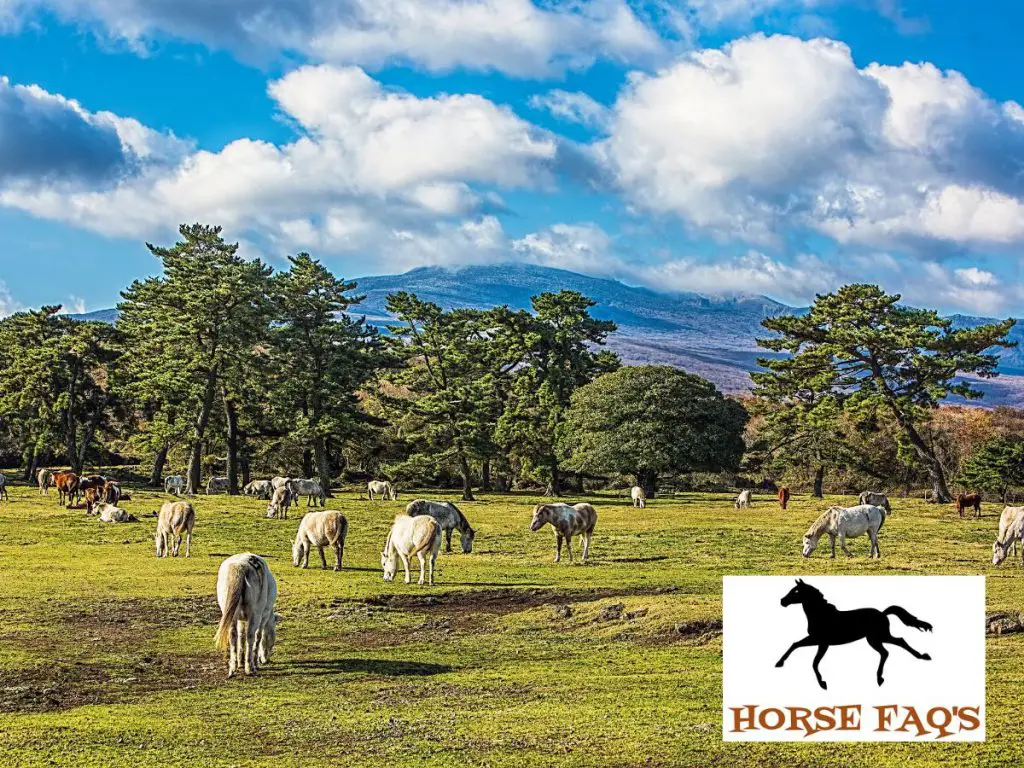
Case Studies Of Successful Horse Property Investors
Investing in horse property can be a lucrative endeavor if done correctly. But it’s important to hear from those who have already achieved success in this field. Examining case studies of successful horse property investors can provide valuable insight into the steps required for financial success.
Like a map, these case studies provide a road forward for other investors to follow. By studying the strategies and techniques of those who have succeeded before us, we can learn how to avoid the same mistakes they made along their journey. From selecting the right piece of land to ensuring that all necessary investments are made, there is much that can be learned from these stories.
For example, take Mr. Smith – a successful investor who purchased his horse property nine years ago and has been able to make a living off it ever since. He invested in fencing and additional outbuildings so he could house more horses on his land, as well as building infrastructure for a small riding arena and trails for customers. TIP: If you want to invest in horse property, it’s important to look at the long-term gains your investment will bring rather than just short-term profits. Establishing reliable sources of income is key for making your venture successful over time.
With this knowledge in hand, you are now ready to begin preparing your own property for horses and creating an investment strategy tailored to your needs!
Preparing Your Property For Horses
Before investing in horse property, it is important to first prepare the property for horses. According to the American Horse Council, an estimated 9.2 million Americans are involved in horse-related activities and the horse industry’s economic impact was estimated at $39 billion in 2017.
To properly prepare your property for horses, consider the following:
- Fences need to be sturdy enough to contain horses and should also be tall enough so that horses cannot jump over them.
- Install adequate drainage systems and water troughs or tanks around the paddock areas, which will provide drinking water for horses and prevent flooding of low-lying areas.
- Make sure there is ample space for grazing and turnout areas with plenty of grass or hay to feed the horses.
- An isolation area should also be provided away from other animals in case one of the animals requires quarantine or treatment.
In addition to preparing your property, it is important to understand how to care for and maintain a horse property as well. Proper maintenance can ensure your land remains suitable for both you and your animals while also preserving its value over time.
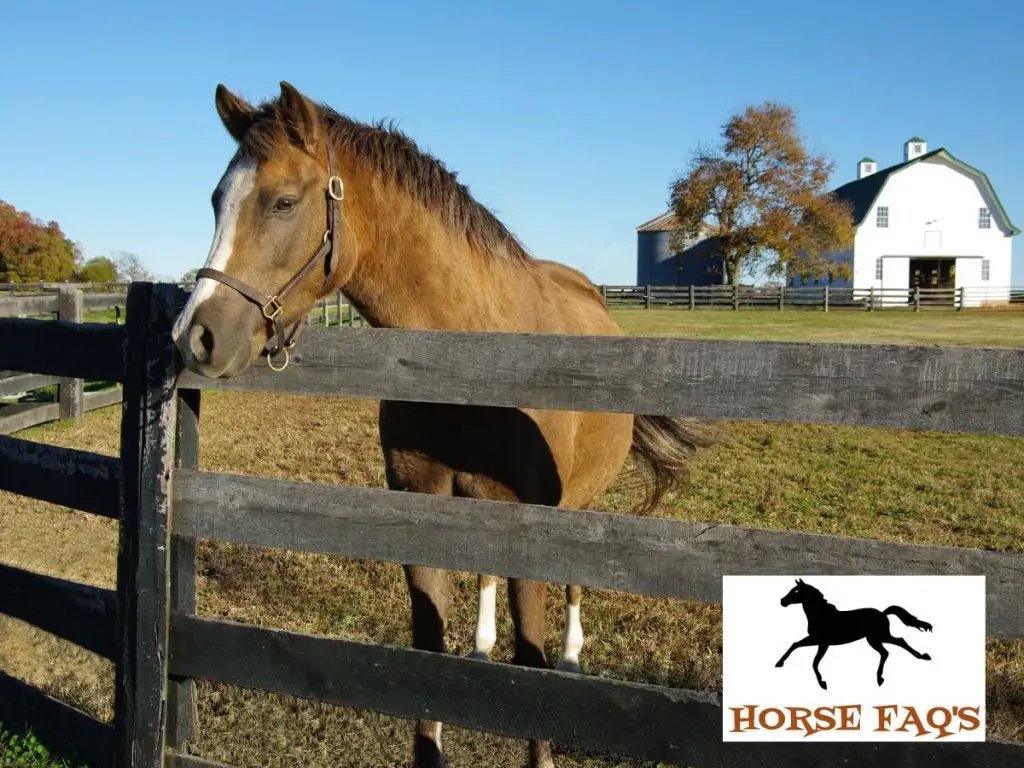
Caring For And Maintaining Horse Property
Maintaining horse property is an exciting, yet challenging endeavor. With a rhetorical flourish, let us explore the three areas of care for horse property that will help ensure success: nutrition, health, and planning.
Nutrition is essential for horses as it provides them with energy and the nutrients they need to stay healthy. It’s important to take into account the type of feed and hay you provide, as well as its quality. You should also be aware of any potential problems caused by overfeeding or underfeeding. Additionally, make sure your horses are getting access to clean water on a regular basis.
In terms of health care, it’s important to keep up with regular vet visits and vaccinations. Not only will this help prevent any diseases or other medical issues, but it will also give you peace of mind knowing that your animals are in good condition. Additionally, consider investing in hoof trimming services to help keep their feet in good condition and prevent lameness or other problems caused by neglecting hooves.
Finally, effective planning can go a long way when it comes to managing horse property. This includes creating a comprehensive budget with estimated costs for feed, vet bills, farrier appointments, etc., as well as setting aside funds for unexpected expenses such as emergency care or equipment replacement. It’s also important to think ahead about what kind of events you want to host on your property and plan accordingly.
By taking all these factors into consideration and having a plan in place before diving into horse property ownership, you can set yourself up for success now and in the future – opening up possibilities like landscaping tips for horse property that we’ll explore next!
Landscaping Tips For Horse Property
With the rising popularity of horse property investment, it is important for owners to know how to maintain and care for their land. Landscaping is an essential part of creating a successful horse property. In fact, according to the US Department of Agriculture, landscaping can add up to 15% value to your horse property.
Creating beautiful and safe landscapes requires knowledge and planning. The first step is to create a plan that will fit both your budget and needs. Consider what type of grasses would be best suited for your area as well as any trees or shrubs that you may want to include in your landscape design.
When choosing plants, remember that they should be selected based on their ability to withstand wear and tear from horses. Hardy grasses like fescue are great options as they can survive through cold temperatures and heavy foot traffic. Additionally, adding features such as riding arenas, trails, and fencing can help improve the look of your horse property while also providing a safe space for horses and riders alike.
By taking the time to plan out your landscaping properly, you will be able to create a beautiful environment for both horses and humans alike that will increase the value of your investment.
Risk Management Strategies For Horse Property Owners
“As the saying goes, ‘no risk, no reward’; however, when it comes to horse property ownership, there is a lot more at stake than just reward. Risk management strategies are essential for horse property owners to ensure they are making the most of their investment.
When purchasing horse property, consider all of the risks associated with owning horses and land: financial risk, legal liabilities, physical safety risks, and environmental concerns. From there, develop a plan that outlines the steps needed to mitigate those risks. It’s important to identify potential risks before buying the property and take proactive measures to reduce them as much as possible. This may include investing in insurance policies tailored for horse owners, having an experienced attorney review legal documents related to ownership or leasing agreements for the land or horses on it, and hiring a professional equestrian specialist to inspect the physical environment of the property.
Having a comprehensive risk management plan in place can help protect both your investments and your peace of mind as a horse property owner. With proper risk management strategies in place before purchasing horse property, you can rest assured knowing your investments have been properly addressed and will be safe going forward.”
Selling Horse Property – What To Expect
For those looking to make a killing in the horse property market, selling your land may seem like the obvious choice. But as we all know, nothing is ever as easy as it looks! Selling your horse property can be a tricky business, and you need to know exactly what to expect.
Let’s face it: putting up a sign that says “Horse Property For Sale” isn’t exactly going to draw in interested buyers. You’ll need to do some serious marketing if you want to get people interested in what you’re offering. From creating flyers to using online listing services, there are plenty of ways to make sure your horse property gets noticed by the right people.
And don’t forget about negotiations! Once you have some interested buyers, you’ll need to be prepared for tough haggling and bargaining over price and terms. It’s important that you keep your cool during this process – after all, these negotiations will determine how much money you walk away with from the sale of your land. With the right strategy, however, you can ensure you get fair value for your horse property…and maybe even more!
Resources For Horse Property Investors
Pondering how to pursue horse property investments? Plenty of resources can provide the answers! From publications to podcasts, there are myriad materials available for potential investors seeking specifics on equestrian investments.
For starters, magazines and newspapers often have useful articles about horse properties. Look for pieces that cover issues like zoning regulations, insurance costs, and market trends. The internet is also an invaluable tool for research; webpages are rife with information on various aspects of investing in horse property. Social media groups and forums focused on equestrian investments can be a great source of advice from experienced professionals.
Podcasts can provide plenty of insight as well. Many shows address topics related to horse property investments, such as land use restrictions or the tax implications of buying a farm. Listeners can get valuable tips from knowledgeable hosts who may have experience in this field themselves.
TIP: Take advantage of all the resources out there when researching horse property investments – don’t limit yourself! With enough knowledge under your belt, you’ll be ready to make informed decisions about potential equine-related investments. As you proceed with your research, take time to ask yourself important questions about the investment before jumping in headfirst.
Questions To Ask Yourself Before Investing In Horse Property
Investing in horse property can be a great opportunity and is worth considering if you’re in the market for real estate. According to the American Horse Council, equine-related industries contribute more than $102 billion to the US economy annually. But before you jump in, there are a few key questions you should ask yourself first.
To get started, it’s important to consider your current financial situation. What is your budget? Are you able to purchase the horse property with cash or will you need to take out a loan? It’s also important to think about what type of maintenance costs will be incurred as well as any other costs associated with owning a horse property such as taxes, insurance, and utilities.
When looking for horse property, here are some things to consider: • Location: Where do you want the property located? • Size: How big does the land need to be? • Zoning: Are horses allowed in that area? • Facilities: Does it have existing barns or fencing for horses?
In addition to these practical considerations, you should also think about how much time and effort investing in horse property will require of you. Will this be an investment that takes up too much of your time or can it become something more passive over time? These are all important things to think about before making an investment.
Frequently Asked Questions
What Is The Average Return On Investment For Horse Property?
It’s a timeless question: is horse property a good investment? The average return on investment for horse property may be the deciding factor.
To begin, it could be said that horse properties have been popular investment opportunities since time immemorial. After all, horses are a symbol of wealth and power. But does investing in horse property actually generate enough capital to make it worth your while?
The answer may vary depending on the location and size of your property. Generally speaking, though, you can expect an average return of 5-10% per year if you make the right investments. That might not sound like much, but if you’re willing to put in some work—like improving infrastructure or capitalizing on nearby amenities—you could see bigger returns over time.
TIP: Do your research before investing in horse property. Check out the local market conditions and trends to get an idea of what kind of returns you should expect in the coming years.
What Are The Common Legal Issues To Consider When Purchasing Horse Property?
When considering investing in horse property, there are several legal issues that need to be taken into account. These potential risks can include zoning regulations, land use restrictions, and liability concerns. It’s important to understand the legal details of the property prior to purchasing it.
One of the main considerations when buying horse property is zoning laws and regulations. Depending on where you are located, these laws may limit or restrict what you can do with the land. It’s essential to research local and state requirements before making a purchase. Additionally, you should also look into any special allowances for horse-related activities that may be available in your area.
Lastly, liability is another key issue when investing in horse property. Horse owners can be held liable for any injuries that occur on their property, so it’s important to have adequate insurance coverage and safety protocols in place. If possible, speak with an experienced attorney who specializes in horse law before making a final decision on your investment.
It’s clear that purchasing horse property requires careful research and planning. By researching the legal aspects of the purchase beforehand, potential investors can ensure they make a wise decision that will benefit them both now and into the future.
What Are The Safety Considerations For Horse Property Owners?
Safety is a paramount consideration for any horse property owner. Whether you’re a seasoned veteran or just starting out, you’ll want to make sure your animals are well cared for in their environment. As such, it’s important to consider the safety of both the horses and the people living and working on the property.
When thinking about safety, think beyond just physical harm – mental and emotional health should be taken into account as well. Horses need to have enough space to roam and explore, as well as access to clean food and water. For people, fencing should be in good condition with no sharp edges or other hazards that could cause injury. The ground should also be even and free of holes or debris that could lead to falls or slips.
Horse owners must also ensure they have proper insurance coverage in place before purchasing a property. This will protect against potential damages caused by horses, such as theft or damage to land or other structures onsite. Additionally, it’s wise to invest in equine first aid supplies so that any minor injuries can be treated quickly and easily without having to wait for professional help. Taking these steps can help provide peace of mind knowing that all those living on the property are safe from harm.
How Does Horse Property Compare To Other Real Estate Investments?
Investing in horse property can be a great way to diversify your portfolio, but it’s important to understand how it compares to other real estate investments. Different criteria should be taken into consideration when comparing the two, such as the cost and potential return on investment. It’s also important to consider safety considerations for horse property owners.
When looking at the cost of horse property versus more traditional real estate investments, there are some key differences to consider. Horse properties tend to require more upfront costs than non-horse properties, including fencing and land improvements. However, these investments can pay off over time if the value of the land increases. On the other hand, traditional real estate investments generally require less upfront costs and may yield a higher return on investment in a shorter amount of time.
Safety is another factor that needs to be taken into account when considering investing in horse property. Horse owners need to ensure their animals have access to proper housing and facilities like stables and pastures that meet their needs. They should also ensure they have liability insurance in case of any accidents or injuries caused by their horses. Additionally, it’s important for horse owners to take steps such as fencing off areas where horses are kept or ridden, which adds an additional layer of safety for both humans and animals alike.
In short, investing in horse property can be a great way to diversify your portfolio while still providing you with a potentially lucrative return on investment over time. It’s essential to understand how it compares to other real estate investments and make sure all safety measures are taken into account before making any final decisions.
What Is The Best Way To Market And Sell Horse Property?
“It takes money to make money” – a timeless adage that applies to the world of real estate investing. With horse property, an investor has the opportunity to bring home lucrative returns, but only if they know how to market and sell it. Every investment has its own unique challenges and considerations, so what is the best way to market and sell horse property?
First, it’s important to understand the target market for horse property. Is it a family with young children looking for their first home or a business professional seeking an equestrian-style lifestyle? Knowing who you are selling to will help inform your marketing strategy and determine which platforms you should use. Additionally, consider partnering with a local Realtor who specializes in horse property; they can offer valuable insight into potential buyers in the area.
Finally, accurately showcasing the property is key. Horse owners often look for things like nearby riding trails, access to stables and tack shops, or proximity to competitions and shows. Take this into consideration when creating listings or marketing materials; feature photos of those amenities along with any other details that might be attractive to potential buyers. By understanding your target audience’s needs and effectively showcasing the asset, investors can maximize their return on investment when selling horse property.
Conclusion
The decision to invest in horse property is an important one that can have a lasting impact on your financial future. In considering the investment potential of horse property, it is important to consider the average return on investment and the legal, safety, and marketing considerations involved. By doing so you will be able to make an informed decision about whether or not investing in horse property is a good fit for your financial goals.
In conclusion, investing in horse property can be a great way to diversify your real estate investments and potentially increase your wealth over time. It is important to understand the legal, safety, and marketing considerations associated with this type of investment before making any commitment. With careful research and consideration of all factors involved, horse property could prove to be a lucrative opportunity for those looking for long-term growth potential as well as short-term returns.
Ultimately, it comes down to individual risk tolerance and goals when deciding if horse property is a good investment for you. By weighing all factors carefully you will be able to make the best decision for your particular situation. Coincidentally, the same considerations apply when deciding if other types of real estate investments are worth pursuing!
